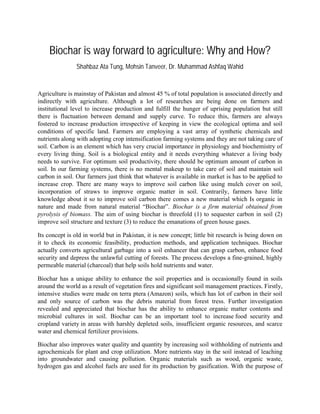Biochar is a way farword to agriculture
- 1. Biochar is way forward to agriculture: Why and How? Shahbaz Ata Tung, Mohsin Tanveer, Dr. Muhammad Ashfaq Wahid Agriculture is mainstay of Pakistan and almost 45 % of total population is associated directly and indirectly with agriculture. Although a lot of researches are being done on farmers and institutional level to increase production and fulfill the hunger of uprising population but still there is fluctuation between demand and supply curve. To reduce this, farmers are always fostered to increase production irrespective of keeping in view the ecological optima and soil conditions of specific land. Farmers are employing a vast array of synthetic chemicals and nutrients along with adopting crop intensification farming systems and they are not taking care of soil. Carbon is an element which has very crucial importance in physiology and biochemistry of every living thing. Soil is a biological entity and it needs everything whatever a living body needs to survive. For optimum soil productivity, there should be optimum amount of carbon in soil. In our farming systems, there is no mental makeup to take care of soil and maintain soil carbon in soil. Our farmers just think that whatever is available in market is has to be applied to increase crop. There are many ways to improve soil carbon like using mulch cover on soil, incorporation of straws to improve organic matter in soil. Contrarily, farmers have little knowledge about it so to improve soil carbon there comes a new material which Is organic in nature and made from natural material ŌĆ£BiocharŌĆØ. Biochar is a firm material obtained from pyrolysis of biomass. The aim of using biochar is threefold (1) to sequester carbon in soil (2) improve soil structure and texture (3) to reduce the emanations of green house gases. Its concept is old in world but in Pakistan, it is new concept; little bit research is being down on it to check its economic feasibility, production methods, and application techniques. Biochar actually converts agricultural garbage into a soil enhancer that can grasp carbon, enhance food security and depress the unlawful cutting of forests. The process develops a fine-grained, highly permeable material (charcoal) that help soils hold nutrients and water. Biochar has a unique ability to enhance the soil properties and is occasionally found in soils around the world as a result of vegetation fires and significant soil management practices. Firstly, intensive studies were made on terra ptera (Amazon) soils, which has lot of carbon in their soil and only source of carbon was the debris material from forest tress. Further investigation revealed and appreciated that biochar has the ability to enhance organic matter contents and microbial cultures in soil. Biochar can be an important tool to increase food security and cropland variety in areas with harshly depleted soils, insufficient organic resources, and scarce water and chemical fertilizer provisions. Biochar also improves water quality and quantity by increasing soil withholding of nutrients and agrochemicals for plant and crop utilization. More nutrients stay in the soil instead of leaching into groundwater and causing pollution. Organic materials such as wood, organic waste, hydrogen gas and alcohol fuels are used for its production by gasification. With the purpose of
- 2. soil remediation biochar surely suitable for application in the agricultural industry as it has a high organic content. Nutrient retention increases in soil, fertilizer leaching reduces and greenhouse gas emissions decrease for thousands of years. Expose biochar to steam and high-pressure oxygen at high temperatures to transform the co- product into activated carbon, which can absorb infected elements of gas decontamination, gold refinement, metal mining, water refinement, medicine, sewage management, and air filtration. Furthermore, Biochar is a tool for climate change mitigation as it allows carbon input into soils and reduce the formation of methane, carbon mono oxide, nitrogen oxides which are responsible for global warming. The carbon in biochar resists degradation and can hold carbon in soils for hundreds to thousands of years. In addition to creating a soil enhancer, sustainable biochar practices can produce oil and gas byproducts that can be used as fuel, providing clean, renewable energy. When the biochar is buried in the ground as a soil enhancer, the system can become "carbon negative." Biochar and bioenergy co-production can help to combat global climate change by displacing fossil fuel use and by sequestering carbon in stable soil carbon pools. It may also reduce emissions of nitrous oxide. Biochar has potential to be introduced in market and utilized extensively by farmers. The writers Shahbaz Ata Tung and Dr. Muhammad Ashfaq Wahid are associated with Analytical lab, Department of Agronomy and Mohsin Tanveer is with Agro-biology lab, Department of Agronomy, University of Agriculture Faisalabad.


